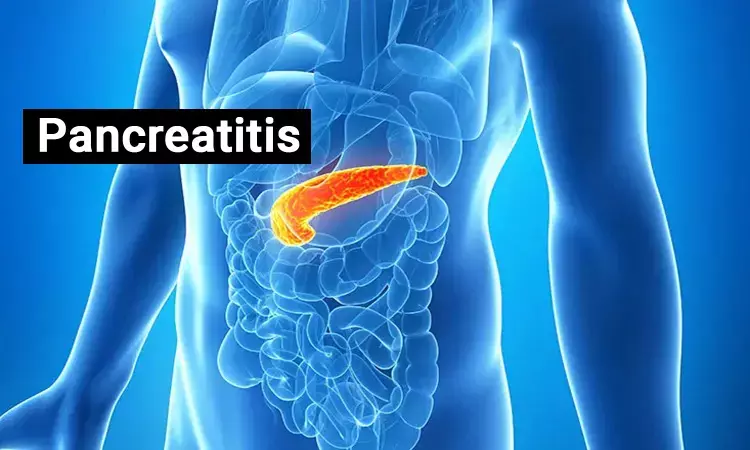- Home
- Medical news & Guidelines
- Anesthesiology
- Cardiology and CTVS
- Critical Care
- Dentistry
- Dermatology
- Diabetes and Endocrinology
- ENT
- Gastroenterology
- Medicine
- Nephrology
- Neurology
- Obstretics-Gynaecology
- Oncology
- Ophthalmology
- Orthopaedics
- Pediatrics-Neonatology
- Psychiatry
- Pulmonology
- Radiology
- Surgery
- Urology
- Laboratory Medicine
- Diet
- Nursing
- Paramedical
- Physiotherapy
- Health news
- Fact Check
- Bone Health Fact Check
- Brain Health Fact Check
- Cancer Related Fact Check
- Child Care Fact Check
- Dental and oral health fact check
- Diabetes and metabolic health fact check
- Diet and Nutrition Fact Check
- Eye and ENT Care Fact Check
- Fitness fact check
- Gut health fact check
- Heart health fact check
- Kidney health fact check
- Medical education fact check
- Men's health fact check
- Respiratory fact check
- Skin and hair care fact check
- Vaccine and Immunization fact check
- Women's health fact check
- AYUSH
- State News
- Andaman and Nicobar Islands
- Andhra Pradesh
- Arunachal Pradesh
- Assam
- Bihar
- Chandigarh
- Chattisgarh
- Dadra and Nagar Haveli
- Daman and Diu
- Delhi
- Goa
- Gujarat
- Haryana
- Himachal Pradesh
- Jammu & Kashmir
- Jharkhand
- Karnataka
- Kerala
- Ladakh
- Lakshadweep
- Madhya Pradesh
- Maharashtra
- Manipur
- Meghalaya
- Mizoram
- Nagaland
- Odisha
- Puducherry
- Punjab
- Rajasthan
- Sikkim
- Tamil Nadu
- Telangana
- Tripura
- Uttar Pradesh
- Uttrakhand
- West Bengal
- Medical Education
- Industry
Prophylactic pancreatic stent in addition to rectal indomethacin effective for preventing post-ERCP pancreatitis

Endoscopic retrograde cholangiopancreatography (ERCP) is a valuable diagnostic and therapeutic procedure, but it comes with the risk of pancreatitis, particularly in high-risk patients. A recent randomized trial assessed two preventive strategies—rectal indomethacin alone versus the combination of indomethacin plus a prophylactic pancreatic stent.
This study was published in the journal Lancet by Prof B Joseph E. and colleagues. The study aimed to evaluate efficacy and safety, providing valuable insights for enhancing post-ERCP patient care.Therandomized non-inferiority trial involving 1950 high-risk patients undergoing endoscopic retrograde cholangiopancreatography (ERCP), researchers evaluated the efficacy of two preventive strategies: rectal indomethacin alone versus the combination of indomethacin plus a prophylactic pancreatic stent.
The primary outcome, post-ERCP pancreatitis incidence, was 14.9% with indomethacin alone and 11.3% with the combination, resulting in a risk difference of 3.6% (95% CI 0.6–6.6; p=0.18 for non-inferiority).
However, a post-hoc analysis revealed the superiority of the combination strategy (p=0.011).
Safety outcomes, including serious adverse events, intensive care unit admission, and hospital length of stay, did not significantly differ between the two groups.
The trial concludes that, for high-risk patients undergoing ERCP, the strategy of using rectal indomethacin alone was not as effective as combining indomethacin with prophylactic pancreatic stent placement. These findings advocate for the adoption of a comprehensive approach, emphasizing the role of prophylactic stent placement in addition to indomethacin administration for optimal prevention of post-ERCP pancreatitis in high-risk patients.
Reference:
Dr Riya Dave has completed dentistry from Gujarat University in 2022. She is a dentist and accomplished medical and scientific writer known for her commitment to bridging the gap between clinical expertise and accessible healthcare information. She has been actively involved in writing blogs related to health and wellness.
Dr Kamal Kant Kohli-MBBS, DTCD- a chest specialist with more than 30 years of practice and a flair for writing clinical articles, Dr Kamal Kant Kohli joined Medical Dialogues as a Chief Editor of Medical News. Besides writing articles, as an editor, he proofreads and verifies all the medical content published on Medical Dialogues including those coming from journals, studies,medical conferences,guidelines etc. Email: drkohli@medicaldialogues.in. Contact no. 011-43720751


